The Crucial BX200 (480GB & 960GB) SSD Review: Crucial's First TLC NAND SSD
by Billy Tallis on November 3, 2015 9:00 AM ESTRandom Read Performance
Our random read performance test is conducted on a full drive and tests queue depths from 1 to 32. We focus primarily on the lower queue depths that are typical of interactive use, but also look at how the performance and power scales to more intensive loads. For desktop use, searching and virus scanning are typically the biggest sources of random reads, and they can exercise some of the larger queue depths. When working on a fragmented filesystem or with lots of small files, random I/O performance (especially for low queue depths) comes into play.
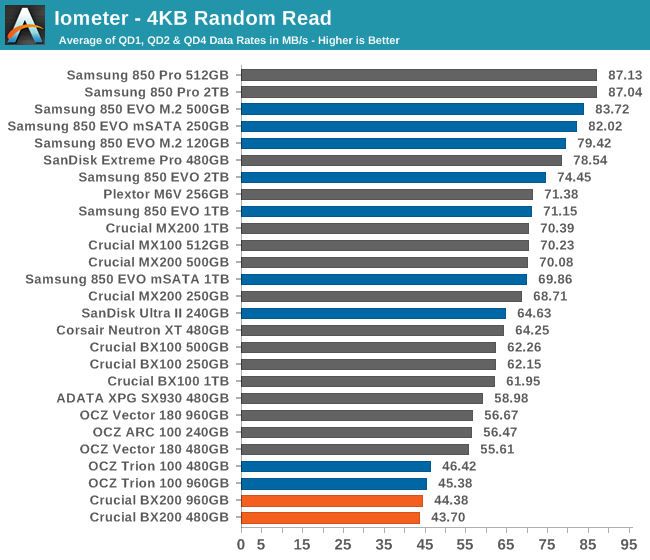
Random reads are slow, but at least the BX200 has company. This is what slow TLC flash does, but unlike many other results so far, this performance is not cause for major concern.
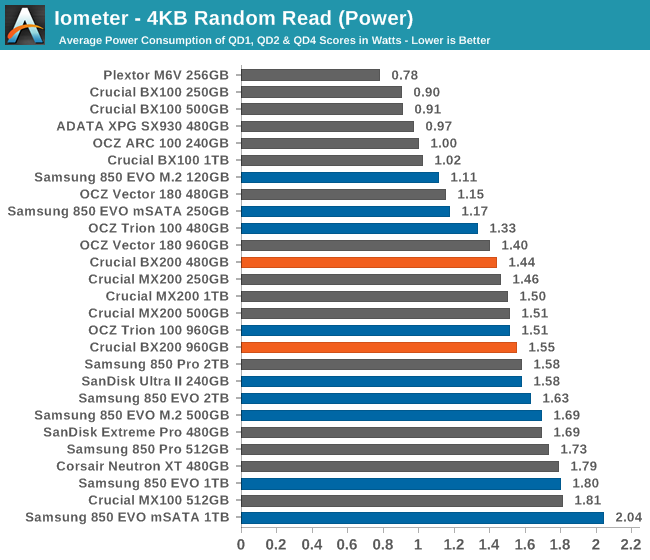
Power consumption is in the middle of the pack, so the BX200 is doing something (almost) right when handling reads.
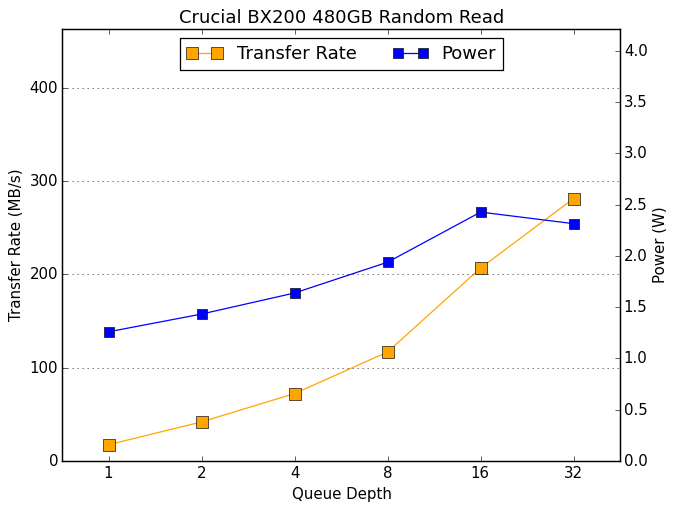 |
|||||||||
| Default | |||||||||
Performance scales smoothly as queue depth increases but it still starts low and never reaches very high.
Random Write Performance
The random write test is confined to a 16GB portion of the drive, which is otherwise empty and fresh from a secure erase. This gives the drive the chance to demonstrate much higher performance than on our performance consistency test that fills the drive. Tasks like installing software updates can modify a lot of files, but aren't hitting the entire disk. Random writes to the entire disk are usually found only in enterprise workloads such as large databases.
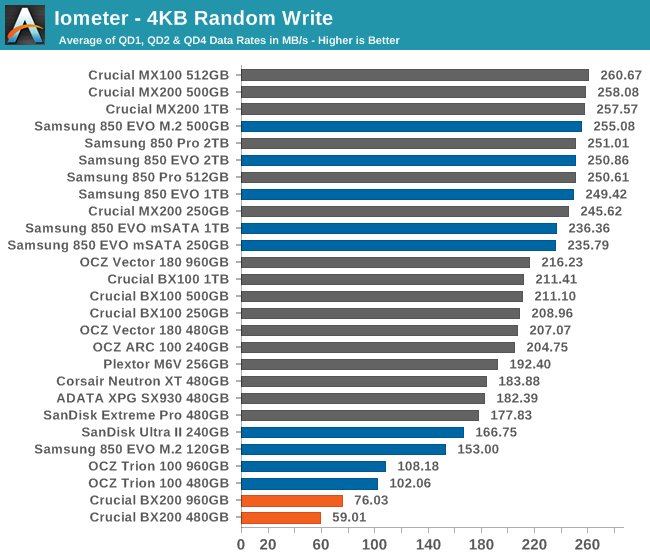
Our Iometer tests run for three minutes at each queue depth, so within 9 minutes the BX200 is clearly having trouble. The higher capacity of the the 960GB drive seems to help a lot, which suggests that the 240GB BX200's performance might be much worse than that of the 480GB.
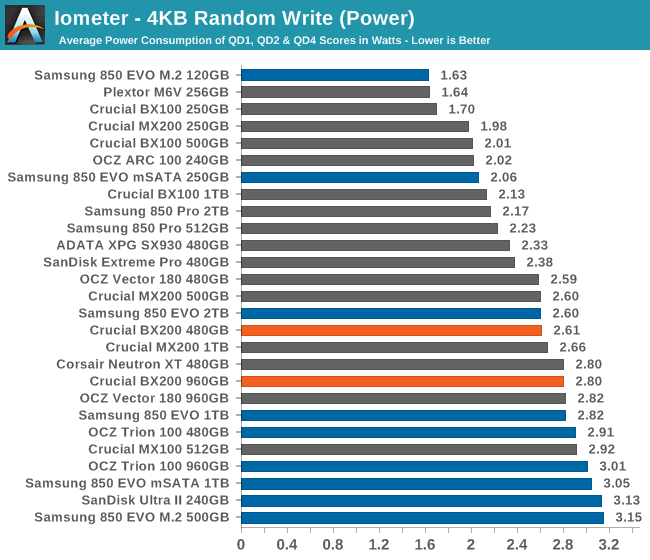
Power consumption is normal for a TLC drive, which suggests that there are a lot of background writes being done by the drive that are keeping power consumption up in spite of how little real work is getting done.
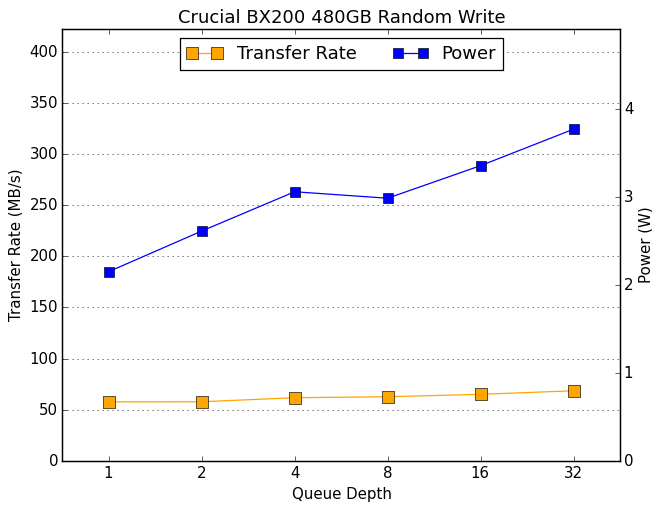 |
|||||||||
| Default | |||||||||
Random write performance hardly scales at all with increased queue depth, which is very uncommon but we have seen similar behavior from the OCZ Trion 100. Power consumption does increase dramatically, so the drive is clearly mismanaging the load of heavy writes.










85 Comments
View All Comments
Shadow7037932 - Tuesday, November 3, 2015 - link
That's kind of disappointing, esp. the 250GB version as it's only a little cheaper than the 850 EVO. However, the 960GB assuming sales/deals, go down to $230-250 in the coming months, I can see people buying it to replace HDDs for say storing games.eek2121 - Tuesday, November 3, 2015 - link
That's MSRP for the BX200. The street prices will probably be much cheaper.Samus - Tuesday, November 3, 2015 - link
For the price your still better off with the OCZ ARC100 with toshiba MLC and. Barefoot3 controller.LB-ID - Tuesday, November 3, 2015 - link
Toshiba's still selling things under the OCZ name? It long since needed to die and go away.Lazlo Panaflex - Friday, November 6, 2015 - link
+1 to that. Lots of people got burned by bad OCZ drives. Pretty dumb of Toshiba to keep calling them that.tamalero - Thursday, November 12, 2015 - link
Reminds me of Hitachi when they bough the IBM dextar drives.anyone remembers the horrible failures of the 10k and 15k rpm drives under IBM?
even their consumer disks were dying like mad.
They sold their business to Hitachi who fixed the mess.
did this happen to Toshiba and the OCZ drives?
leexgx - Tuesday, November 3, 2015 - link
the poor power use on that drive is very bad (why i got the BX100 as it has overall best lowest power usage under almost all loads) BX100 is not the fastest SSD drive around but BX200 for £10 more is not good, same with the MX200 as wellcoconutboy - Tuesday, November 3, 2015 - link
For several months now, on a near-weekly basis, Samsung Evo drives are hitting sale prices of ~$150 for 500GB and $75 for 250GB. Except for customers not paying attention, Crucial is gonna have a tough time moving these bx200 when there's unproven reliability, almost no price advantage, and a huge performance deficit.Crucial needs to drop their msrp or cut retailers a deal to lower street prices.
eek2121 - Tuesday, November 3, 2015 - link
You are comparing MSRP to street prices. Most of the SSDs in that list are running at least $20 (and sometimes much more) below MSRP. I'm betting $0.25-$0.27 per gig once these things see widespread availability. Don't be surprised if this drive causes price brackets to move again. 480/512 where the 256 was, 960/1tb where the 512 was, etc.The_Assimilator - Tuesday, November 3, 2015 - link
It bloody well *better* move price brackets, since it's apparently not good for much else.